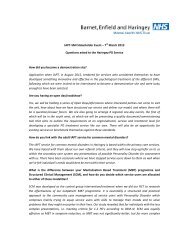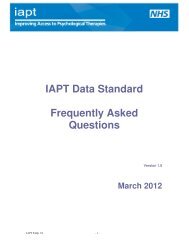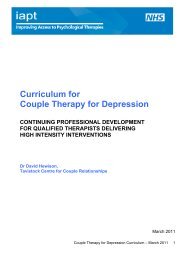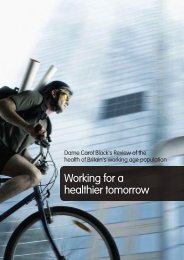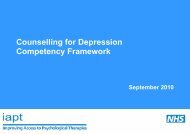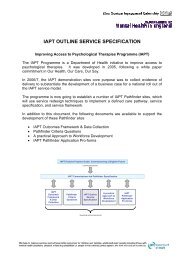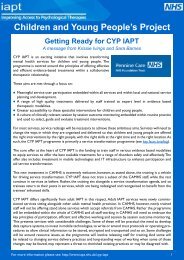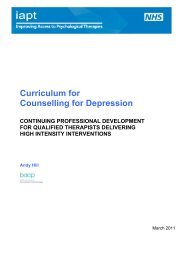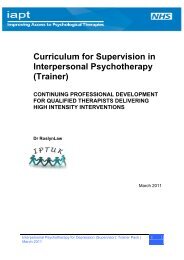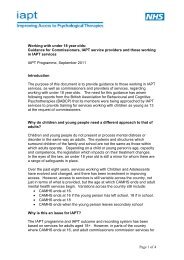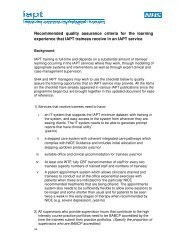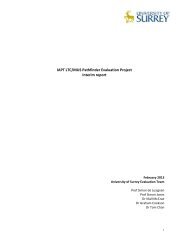December 2012 - IAPT
December 2012 - IAPT
December 2012 - IAPT
- No tags were found...
Create successful ePaper yourself
Turn your PDF publications into a flip-book with our unique Google optimized e-Paper software.
Children and Young People’s ProjectUpdate from the North-EastWe consist of Northumbria University Faculty of Health and Life Sciences, Rotherham, Doncaster andSouth Humber NHS Foundation Trust (RDASH) and Tees, Esk and Wear Valleys NHS Foundation Trust(TEWV).Applying for and then preparing to be a site for CYP <strong>IAPT</strong> has been hectic at times, but has also been anenlightening and empowering journey for our organisations, from initial construction of the bid (March<strong>2012</strong>), to university validation of academic programmes (November <strong>2012</strong>).Universities often involve stakeholders when planning professional development for practitioners, butNorthumbria has achieved a much deeper level of engagement when applying for CYP <strong>IAPT</strong> and planningcourses. CYP <strong>IAPT</strong>’s “whole systems transformational” approach contrasts with the usual process of servicesseconding students to courses. It is often assumed that after completing training courses studentsreturn to practice with developed skills, and service improvement logically follows. Whilst this may betrue, the service transformation agenda embedded within CYP <strong>IAPT</strong> makes sure that improvement is anexplicit rather than an implicit assumption.Collaborating trusts have been working closely with university providers. Workforce and staff developmentare important issues for effective service transformation. The CYP <strong>IAPT</strong> approach has led to a moresystematic consideration of workforce development. Supervisors and service leads have already beguntraining and the main programme is due to start in January 2013, with participants looking forward to theirtraining – whilst, of course, being slightly apprehensive about the journey ahead. The collaboration betweenorganisations will not cease once planning is complete, but is integral to the main academic programme.Trust partners have gained a useful insight into the processes involved in operationalising an academicprogramme from conceptual curriculum to tangible delivery. At the validation event we were praised forour collaborative approach to development.Young people were actively involved in the recruitment of students and this input has been a delight forthe university and both partner trusts. For us this experience underscored the importance of ensuringparticipation throughout planning and implementation.The national project team has been a tremendous source of support, and existing collaboratives havekindly shared their experiences and ideas. The process has not been without hitches, but strong relationshipshave been forged between three like-minded organisations that are future-facing and embracetransformational change in the pursuit of high-quality services. This has resulted in clear mutual expectationsduring the application and project initiation stages, laying a firm foundation for collective problemsolvingas we move to implementation.For more information please see: http://www.iapt.nhs.uk/cyp-iapt8



